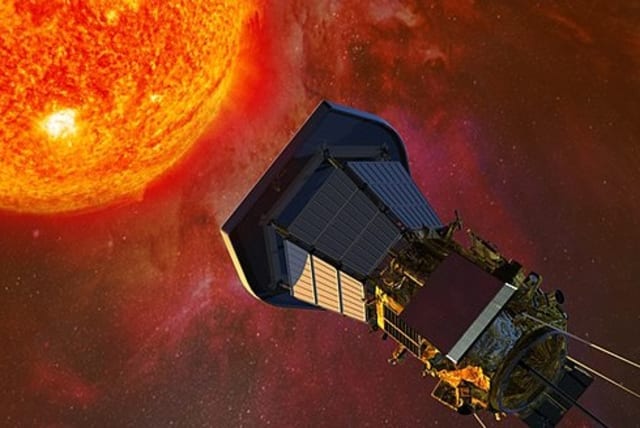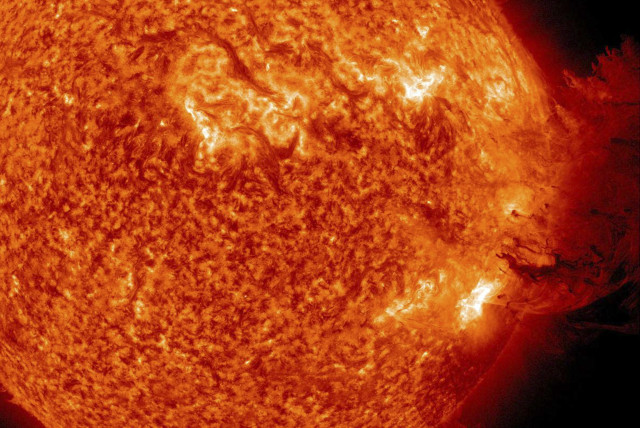Death by solar storm: NASA mission could save the internet from apocalypse

The mission was launched with the goal of preventing charged particles from disrupting internet signals on Earth.
NASA’s Parker Solar Probe (PSP) set off for a first-of-its-kind mission to travel through solar winds in space.
The mission was launched with the goal of preventing charged particles from disrupting internet signals on Earth, according to a report on NASA’s website on June 20.
Concerns of the implications of solar storms have plagued the minds of scientists and internet addicts alike, because of the potentially devastating impact that a months-long internet outage could cause.
The PSP, which originally launched five years ago, launched on a trajectory that positioned it dangerously close to the sun’s surface, where solar wind is generated.
The new data was collected as part of a peer-reviewed study published on March 2023 in The Astrophysical Journal.
The solar winds produce charged particles that are expelled from the Sun’s atmosphere and can create what is known as a ‘solar storm.’ The solar storm is believed to have the capacity to disrupt signals from Earth, creating issues with internet access.
“This new data shows us how the solar wind gets going at its source,” said Nour Raouafi, the study lead and the Parker Solar Probe project scientist at the Johns Hopkins Applied Physics Laboratory (APL) in Laurel, Maryland. “You can see the flow of the solar wind rising from tiny jets of million-degree plasma all over the base of the corona. These findings will have a huge impact on our understanding of the heating and acceleration of the coronal and solar wind plasma.”
“Previously, we could not detect enough such events to explain the observed amount of mass and energy streaming from the Sun,” said Judy Karpen, a co-author on the paper and heliophysicist at NASA’s Goddard Space Flight Center in Greenbelt, Maryland. “But the improved resolution of the observations and meticulous data processing enabled the new findings.”
“The tiny reconnection events we observed are, in a way, what Eugene Parker proposed over three decades ago,” Raouafi said. “I am convinced that we are on the right path toward understanding the solar wind and coronal heating.”
Why do we believe that a solar storm will cause internet outages?
It was a study produced in 2021 that originally theorized the risks that a solar storm could have on the Earth’s internet access, according to Express. The University of California found a 12 percent chance that a catastrophic months-long disruption could occur in the next decade.
"Winds carry lots of information from the sun to Earth. So understanding the mechanism behind the sun's wind is important for practical reasons on Earth,” said Professor Stuart Bale, the author of the study.
"That's going to affect our ability to understand how the sun releases energy and drives geomagnetic storms — which are a threat to our communication networks."
The researchers described what they saw as "seeing jets of water emanating from a showerhead through the blast of water hitting you in the face."
Every 11 years, when the sun is in its active phase, magnetic energy is expelled through holes across the Sun’s surface, which generates the solar winds. These winds are then directed toward the Earth.
Jerusalem Post Store
`; document.getElementById("linkPremium").innerHTML = cont; var divWithLink = document.getElementById("premium-link"); if (divWithLink !== null && divWithLink !== 'undefined') { divWithLink.style.border = "solid 1px #cb0f3e"; divWithLink.style.textAlign = "center"; divWithLink.style.marginBottom = "15px"; divWithLink.style.marginTop = "15px"; divWithLink.style.width = "100%"; divWithLink.style.backgroundColor = "#122952"; divWithLink.style.color = "#ffffff"; divWithLink.style.lineHeight = "1.5"; } } (function (v, i) { });

